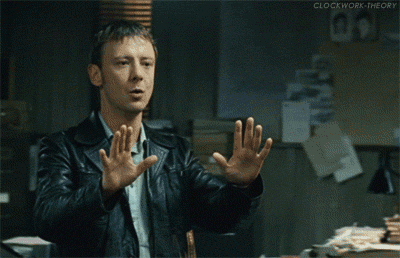Today's Underdog: America (wait, what?)
Hey, this is Brian over from Repeating History here to share with a little story about an underdog. So sit back, relax, and hold on tight, because heeeere we go!
The American Revolution is the ultimate underdog story. The scrappy, ragtag bunch of colonists band together to fight for justice and freedom and beat the big, bad empire by virtue of a fantastic leader, some clever tricks, and the fact that they were fighting for the right reasons. Then again, I also just described the plot of Little Giants, if you substitute "neighborhood kids" for "colonists."
 |
| George Washington Incarnate |
However, as Austin already mentioned in a previous post, America may or may not have been the underdog in that conflict. The Americans fought with French equipment, benefited from French training, and had the French navy wipe out the British naval advantage by fighting them back in England. Essentially, the American Revolution was a lot like the Soviet invasion of Afghanistan; both were essentially used as proxy wars between bigger powers.
 |
| Like the Empire and the Rebellion |
But this is a blog about underdogs, so I'm not going to talk about that any more. I only brought that up because it's what everyone immediately thinks of when Americans are mentioned as the underdogs. But the real underdog story came not from war, but from peace.
You see, a few years after the end of the Revolutionary War and the establishment of the United States, a little spat called the French Revolution broke out. At first, Americans were on the side of the French. The idea of throwing out an inefficient monarchy and replacing it with a constitutional republic seemed to resonate with them. And the first few years were great, but things soon went downhill.
In 1793, France was at war with the majority of Europe, and things weren't going especially well for them. So they turned to America and asked for our assistance. France had some legitimate arguments that we owed them, namely the fact that they had essentially given America independence, but lots had changed in a few years. Because of the increasing radicalism in France, America wasn't even sure that they should recognize the new revolutionary government, let alone go to war for them.
 |
| "Hold on, you never said anything about fighting all of Europe." |
So in the end, we did what the image above suggests: backed out. George Washington issued the Proclamation of Neutrality, which recognized the revolutionary government but stated that we would stay out of the conflict.
So how is this an underdog story, you ask? Well, think about it from the perspective of George Washington: the country you're currently in charge of is less than 20 years old and just implemented its newest system of government just over 5 years ago, and now the world power that essentially gave your country its independence (and that you completely stiffed on paying back wartime loans) is in trouble. How many people would turn to one of the most powerful countries in the world and say, essentially, "Thanks for all the help in our war, but we're just gonna stay out of yours"? And how many would have that reaction set them onto the path towards becoming the most powerful nation in the world?
The fact that this worked was even more shocking than the fact that the US even tried it to begin with. To be fair it almost led to war soon after, but that got straightened out pretty quickly. In the end, this move was like running The Annexation of Puerto Rico to steal the game from the Cowboys (or Texans). It just goes to show you, sometimes the most shocking plays from the underdog come when you least expect it.
Good point, I think Hollywood underdogs are often the hard-working, moraled people of the world, yet this clearly shows that while America was the alleged underdog, it did not necessarily stick to its core values.
ReplyDelete